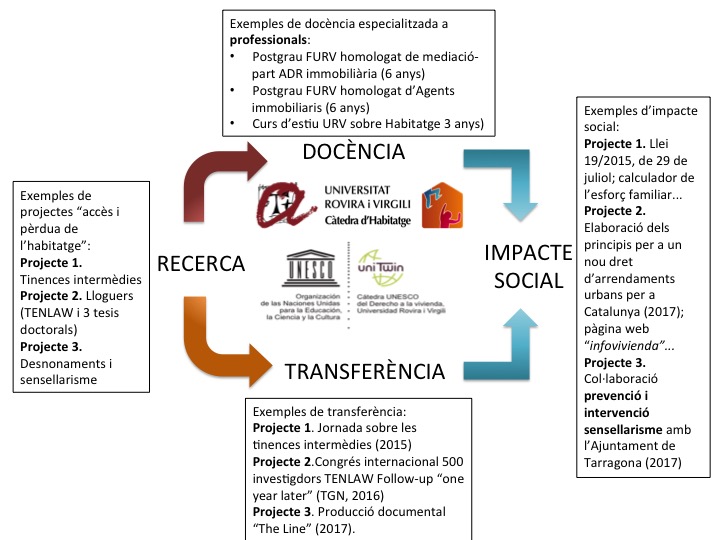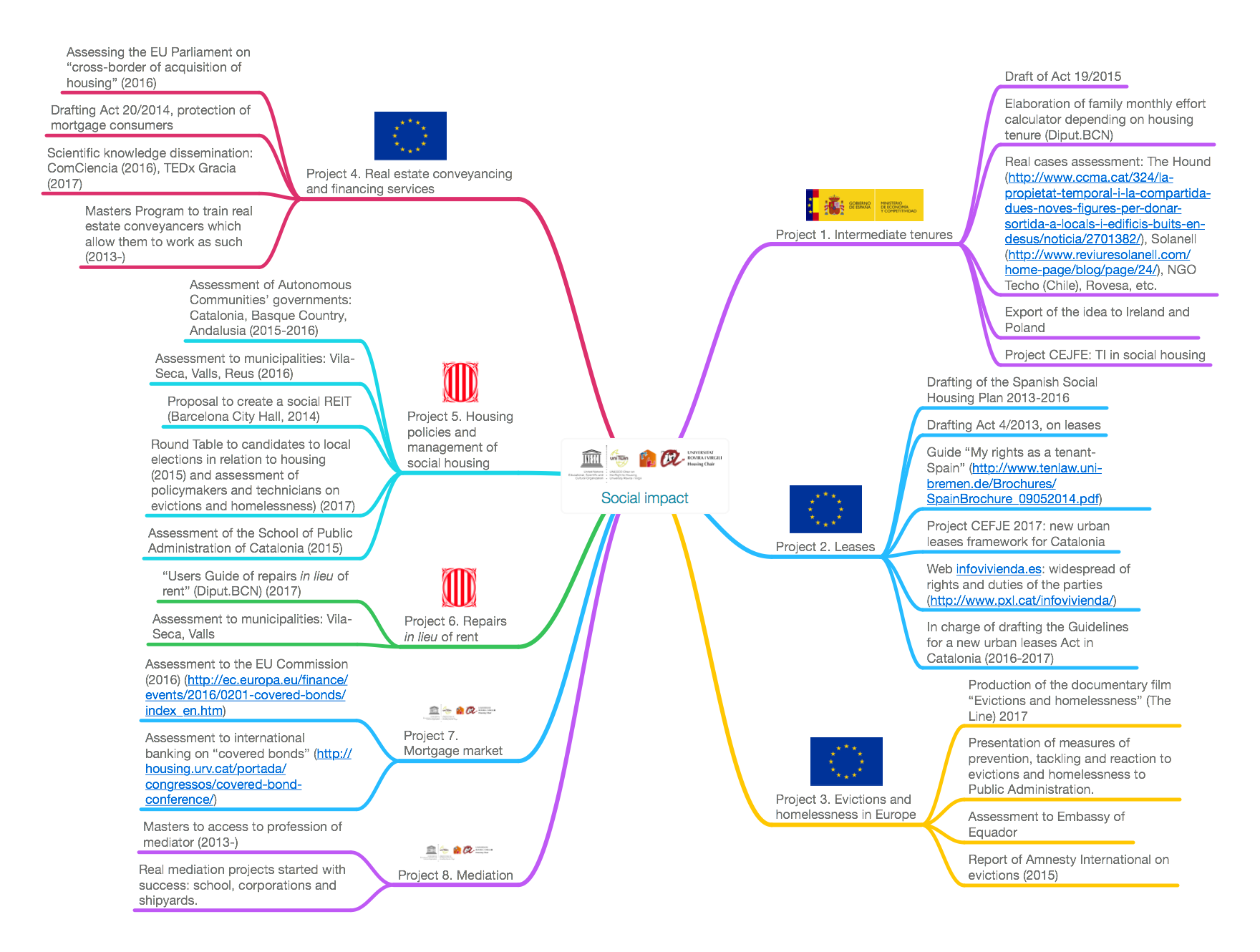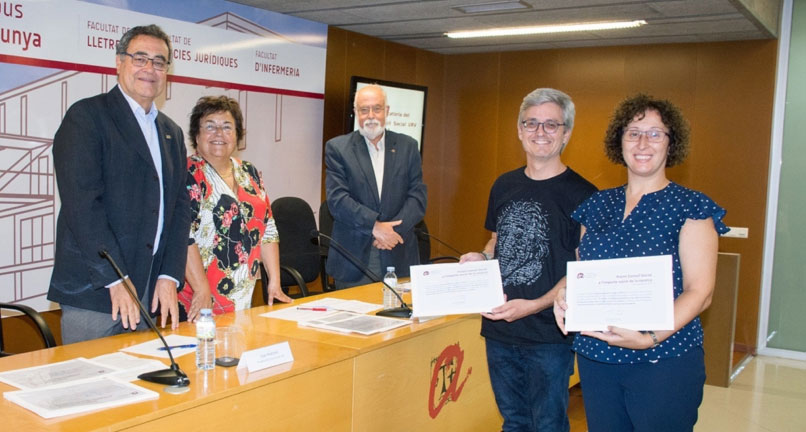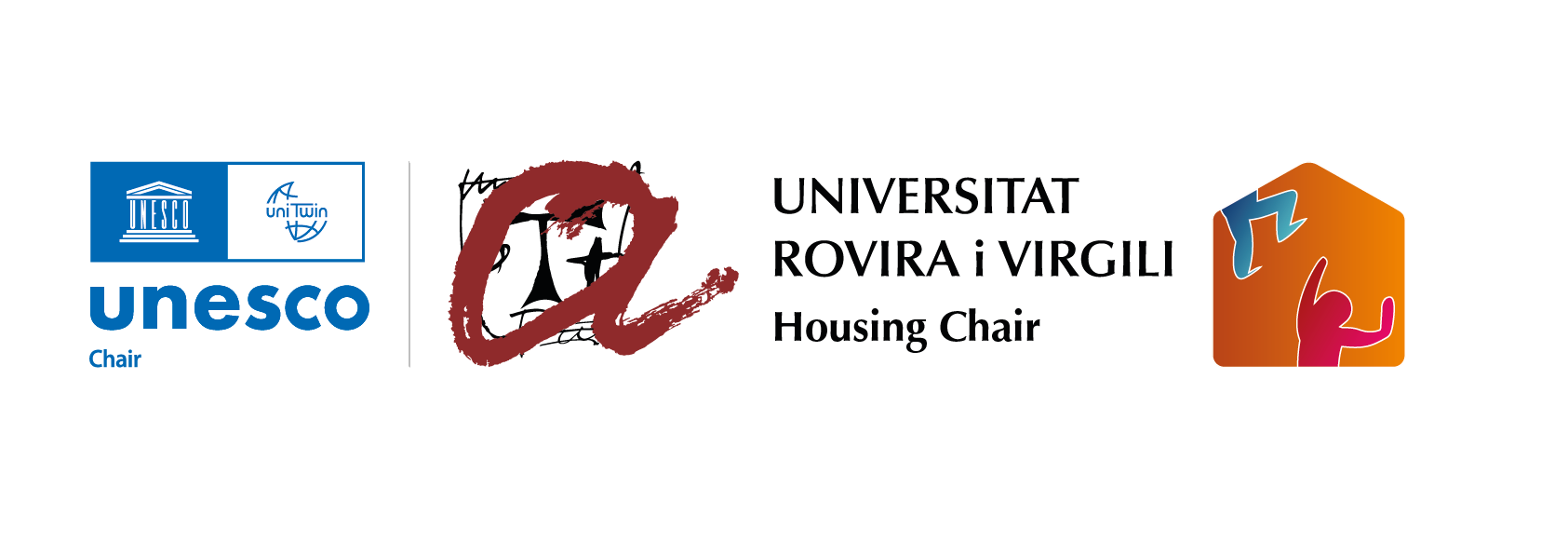1. Social impact
The social impact of the Chair’s research line in housing seeks to facilitate access to housing for families and prevent their loss.
The clearest evidence so far is the development of four housing laws that have influenced improving access conditions for 47 million people.
2. Context
The economic crisis, which began in 2007 with a ratio of up to 80,000 evictions/year in Spain and which still lasts, has revealed the importance that housing has for both the economy and people. Housing is, in fact, the only good that is both a financial asset and a human right.
This is what makes our research so special, that we develop it interdisciplinarily and holistically: housing as a human right, access to housing, management and organization of housing and housing as a capital or economic asset. Our work has received the ICREA Academy 2016-2020 award.
In addition, the fact that the URV Chair of Housing has 12 partners from the professional world and the Administration means that its research is linked to society and stakeholders, the the day to day needs, problems and challenges of this sector.
In fact, according to Ms. Pilar Martínez, former Director General of Housing of the Ministry of Development, in the public presentation of the Chair in 2014 stated that “if [it] existed years before the 2007 crisis, we could have foreseen it or reduce its consequences.”
3. Impact achieved
Our line of research seeks to improve access to housing and prevent its loss, so we give a clear return to society.
Figure 1 shows our value chain, taking as an example three of the projects that make up this line of research:
- Intermediate tenures. The problem to solve is the impossibility of the middle and lower classes to access a stable housing in property without becoming over-indebtedness. Solution resulting from the research: creation of two intermediate housing tenures (shared ownership and temporary ownership) unknown since Napoleon’s times. Evidence of social impact up to now: Law 19/2015 has been drafted affecting 7.5 million Catalans who can access a house in a stable, flexible and non-over-indebted manner. Developing an on-line “Family Effort Calculator” to help individuals and professionals choose the best type of housing tenure. It is transferable, since one of its first real uses has been to buy a hardware store and we have exported them to Poland and Ireland.
- Housing tenancies. Problem: With the European project TENLAW we studied why tenancies work in some countries and not others, like Spain. Solution: rents should be regulated as a real alternative to the property, to avoid future real estate bubbles. Evidence of social impact: In 2013 we contributed to the reform of the State Lease Law (LAU), affecting 48 million people and in 2017 we have designed some principles for Catalonia, contributing to the implementation of the first Reference Rate of leases in Spain, contributing decisively to the transparency and dynamisation of this market. The web “Infovivienda” already solved since May 2017 doubts of owners, professionals and tenants, fruit of our investigation.
- Evictions and homelessness. Problem: how many are being evicted in Europe and who ends up homeless. Solution: We have found measures that work to prevent, tackle and react to these phenomena and that we can apply locally. Evidence of social impact: we have produced a documentary (“The Line“) that seeks to raise awareness among politicians and society in general about the problem of “homelessness”.

Figure 1. Value chain
By translating our research into civil laws, our impact is sustainable, since they do not have a cost to the Public Administration and can last for years.
Figure 2 briefly shows the evidence of the social impact we have so far of all projects.

Figure 2. Evidences of social impact in research of housing (2017)
4. Impact contribution
To promote the effectiveness of the right to adequate and adequate housing is provided for in the Spanish Constitution (Articles 10 and 47), the Statute of Autonomy of Catalonia (Article 26), the State Housing Plan (2013-2017), is a Social Pillar of the EU and is present in the New Urban Agenda Habitat III 2016 of the UN, where the line of action is marked worldwide for the next 20 years.
In fact, our contribution is multi-level:
- International. UNESCO and the UN have invited us to collaborate in the implementation of the New Urban Agenda, given our know-how in bringing research to the legislative and policy realities.
- EU field. We advise to the European Parliament on the problem of cross-border real estate transactions and also the European Commission in topics related to the mortgage market.
- Spanish scope. We have participated in the elaboration of Law 4/2013 (LAU) and the Spanish Housing Plan from 2013 to 2017. We also highlight the collaboration with professional initiatives, such as “The Hound” and Revivir el Solanell projects, and banking ones such as the reverse mortgage (BBVA) and the condohoteles (Banco Sabadell).
- Catalan field. We have promoted and contributed to the preparation of Law 20/2014 (protection of mortgage consumers) and Law 19/2015 (intermediate tenures).
- Local scope. We have participated in the delimitation of the objectives and implementation of the action plans of both councils (homelessness) and provincial councils (reparations in lieu of rent).
- Finally, it is worth mentioning that we are a meeting point between the different professionals of the sector through workshops and workshops that we organize and the society. Invited to “Do you want to know what I investigate?” (ComCiencia of the URV) and the “TEDx Gracia“.
5. Researching to improve people’s access to housing
6. Awards
 The Threshold: promoting protection of the right to housing – Homelessnes prevention in the context of evictions”, a research project promoted by the UNESCO Housing Chair, has been awarded a prize from the Social Council URV due to its social impact. This social impact award recognizes, under the category of social sciences and humanities, those research projects that are expected to improve the society. The proposal was submitted by Sergio Nasarre, Estela Rivas and Juan Luis Gonzalo, thanks also to the collaboration of Marc Solé, Ariadna González, Héctor Herrero, Isidre Monreal, Neus Sabaté, Javier Coca and Jordi de Andrés.
The Threshold: promoting protection of the right to housing – Homelessnes prevention in the context of evictions”, a research project promoted by the UNESCO Housing Chair, has been awarded a prize from the Social Council URV due to its social impact. This social impact award recognizes, under the category of social sciences and humanities, those research projects that are expected to improve the society. The proposal was submitted by Sergio Nasarre, Estela Rivas and Juan Luis Gonzalo, thanks also to the collaboration of Marc Solé, Ariadna González, Héctor Herrero, Isidre Monreal, Neus Sabaté, Javier Coca and Jordi de Andrés.

